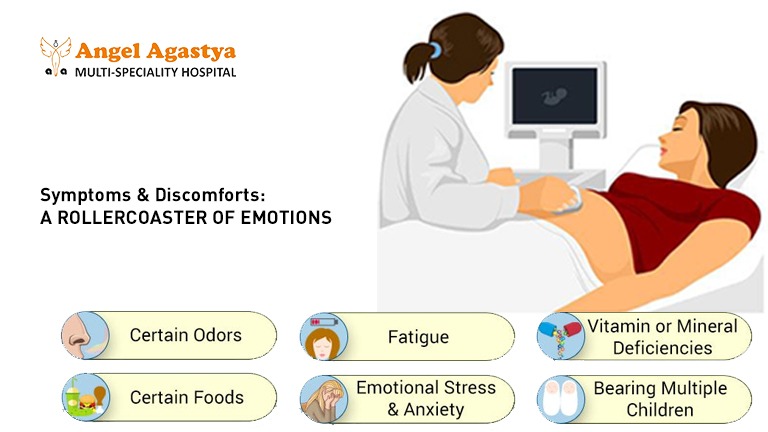Introduction to Morning Sickness:
the sun starts to rise, making the sky turn pink and orange. You reach for your favorite mug, ready to greet the day with a steaming cup of coffee. But as you bring the mug to your lips, a wave of nausea washes over you. The coffee that once promised a perfect start now seems like the enemy.
This, my dear reader, is the unwelcome visitor most pregnant women know all too well: morning sickness. It might not arrive precisely at dawn, but its presence can leave you feeling utterly defeated. But take heart! While the nausea and discomfort can be real, morning sickness doesn’t have to define your pregnancy journey.
This guide is your trusted companion, offering a beacon of hope in a sea of queasiness. We’ll delve into the “whys” and “hows” of morning sickness, unpack the emotional toll, and equip you with a toolbox of natural remedies and effective strategies to manage it. From calming ginger tea to acupressure techniques, you’ll discover a wealth of solutions to navigate this trimester with more ease and, dare we say, enjoyment. Remember, morning sickness is a temporary hurdle, and with knowledge and a personalized plan, you can conquer nausea and embrace a smoother, more positive pregnancy experience.
Symptoms & Discomforts: A Rollercoaster of Emotions
Morning sickness might have a misleading name. It can strike any time of day, leaving you feeling like you’re on a constant rollercoaster ride. The most common culprits are nausea and vomiting, but the discomfort can extend beyond that. Food aversions, once-loved scents suddenly turning repulsive, and a persistent metallic taste in your mouth can make even the simplest tasks feel overwhelming.

But morning sickness isn’t just a physical battle; it takes a toll on your emotions too. Anxiety about the unknown, frustration at feeling out of control, and fatigue that makes even getting out of bed seem monumental can leave you feeling utterly depleted. It’s perfectly normal to experience these emotions, and you’re not alone in this journey.
Causes & Risk Factors: Unveiling the Mystery
The exact cause of morning sickness remains a bit of a scientific mystery, but the leading theory points to the hormonal changes that occur during pregnancy. The surge in human chorionic gonadotropin (HCG), a hormone produced by the developing placenta, is a prime suspect. This hormonal shift can disrupt your digestive system, leading to nausea and vomiting.
Certain factors can increase your risk of experiencing morning sickness. If you have a history of motion sickness, you might be more prone to it. Carrying multiples (twins, triplets, etc.) can also elevate your risk, as your body experiences a more significant hormonal shift. And sometimes, it can simply run in the family – so, if your mother or sister battled morning sickness, you might too.
Myth Busters: Separating Fact from Fiction
Here’s the thing: morning sickness doesn’t have to come with a side of misinformation. Let’s debunk some common myths:

- Myth: Morning sickness means you’re having a boy. Fact: There’s no scientific link between the baby’s sex and morning sickness.
- Myth: You have to vomit every morning to be truly pregnant. Fact: While nausea and vomiting are common, some women experience only mild queasiness or no symptoms at all.
- Myth: Morning sickness lasts the entire pregnancy. Fact: For most women, morning sickness subsides by the second trimester.
Remember, every pregnancy is unique. Your experience with morning sickness might not mirror someone else’s, and that’s perfectly okay.
Natural Remedies & Self-Care: Empowering Yourself
Now, let’s move from understanding the “why” to the “how.” Here’s your toolkit for managing morning sickness naturally and taking back control:
Dietary Strategies:
- Ginger: This wonder root is your friend! Ginger tea, ginger chews, or even adding a sprinkle of ginger to your food can significantly reduce nausea.
- Bland Foods: Crackers, plain toast, or dry cereal can settle your stomach.
- Small Frequent Meals: Eating smaller portions more frequently can help keep your stomach from getting overwhelmed.
- Hydration is Key: Dehydration can worsen nausea. Opt for water or clear broths to keep dehydration at bay.
Lifestyle Adjustments:
- Prioritize Sleep: Fatigue can exacerbate nausea. Aim for 7-8 hours of sleep each night.
- Stress Busters: Stress can worsen morning sickness. Practice relaxation techniques like yoga or meditation.
- Fresh Air: Step outside for a breath of fresh air. Step outside and let the world rejuvenate your spirit.
- Acupressure: Applying pressure to specific points on your body, like the P6 point on your inner wrist, can help alleviate nausea. However, consult a qualified acupuncturist for proper technique.
- Aromatherapy: Certain essential oils, like peppermint or lavender, may help ease nausea. However, use them with caution during pregnancy and only with a doctor’s approval, as some oils can be harmful.

Creating a Morning Sickness Management Plan: Taking Charge
Knowledge is power, but knowledge paired with action is a winning combination. Here’s how to create a personalized morning sickness management plan:
- Work with your Doctor: Discuss your symptoms and concerns with your doctor. They can offer guidance and recommend safe and effective remedies tailored to your needs.
- Plan Your Meals: Having bland snacks readily available can be a lifesaver. Stock up on crackers, fruits, and ginger chews to keep nausea at bay.
- Manage Morning Sickness at Work: Talk to your employer about flexible work arrangements or access to a private space if needed. Having a trash can readily available and keeping mints or ginger chews on hand can also be helpful.
When to See a Doctor: Seeking Support
While morning sickness is a common part of pregnancy, there are situations where seeking medical attention is crucial. Here are some red flags to watch for:
- Severe Dehydration: Signs include excessive thirst, dizziness, and infrequent urination.
- Persistent Vomiting: If you’re unable to keep anything down, including liquids, consult your doctor immediately.
- Weight Loss: Significant weight loss due to persistent vomiting can be a concern.
Medication: A Last Resort

There are medications available to treat severe morning sickness, but they should only be considered as a last resort and always discussed with your doctor. Your doctor will weigh the risks and benefits to determine if medication is the right course of action for you.
Summarizing the Morning Sickness Journey
We know morning sickness can be a challenging hurdle, but remember, it’s temporary. By embracing the natural remedies we’ve discussed, creating a personalized plan with your doctor, and prioritizing self-care, you can conquer nausea and move forward with a more positive outlook.
The joy of welcoming a new life into the world is an incredible experience. Don’t let morning sickness steal that joy from you. With knowledge, empowerment, and a touch of self-compassion, you can navigate this chapter with grace and emerge stronger, ready to embrace the beautiful journey of motherhood.
FAQs:
- Can morning sickness affect my baby?
While unpleasant, this usually doesn’t harm the baby. However, severe cases that lead to dehydration can be a concern. Always consult your doctor if you’re worried about dehydration. - What are some vitamins and minerals that might help with this?
Vitamin B6 and ginger are sometimes recommended, but it’s crucial to discuss any supplements with your doctor before taking them. - Are there any pregnancy apps that can help manage morning sickness?
Yes, some pregnancy apps offer features like food tracking, symptom logging, and mood trackers. These can be helpful tools to monitor your symptoms and identify trends. - Can this be a sign of a multiple pregnancy?
It can be a factor, but not a definitive indicator. Many women carrying singletons experience morning sickness, and some women with multiples might not. - What are some acupressure points that might help with this?
The P6 point on the inner wrist is a commonly used point. However, for proper technique and to ensure it’s safe for you, consult a qualified acupuncturist. - Are there any wearable devices that can help manage morning sickness?
Acupressure wristbands and aromatherapy diffusers are available, but the scientific evidence for their effectiveness in managing this is limited. Discuss these options with your doctor if you’re interested. - Can morning sickness be a sign of an underlying medical condition?
In rare cases, yes, it could be. However, morning sickness is usually related to hormonal changes in early pregnancy. If you have any concerns, discuss them with your doctor. - What medications are typically prescribed for severe morning sickness?
Some anti-nausea medications might be considered, but this should only be discussed with your doctor after exploring other options. - Are there any home remedies that should be avoided during pregnancy?
Avoid herbal remedies unless specifically approved by your doctor. Some herbs can be harmful during pregnancy and might even trigger complications. - Will morning sickness come back with every pregnancy?
There’s no guaranteed answer. Some women experience it with every pregnancy, while others don’t experience it at all. It’s a case-by-case scenario.
Remember: This blog is intended for informational purposes only. Always consult your doctor with any questions or concerns about morning sickness or your pregnancy in general.

